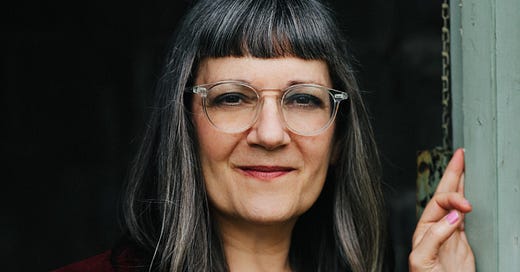Taking Up Space: A Conversation with Sari Botton
On the happiness of speaking your truth, finding compassion for yourself, toxic positivity, writing as a political act, death, making lists, doing the next right thing, being cool, and singing.
Intimate conversations with our greatest heart-centered minds.
I can’t recall when I first became aware of Sari Botton. I feel like the moment I joined social media she was there, this generous, benevolent presence watching over all the writers. And writing some badass work herself. I do recall I wanted nothing more than to publish an essay in Longreads, where Sari was the essays editor, and still vividly remember being on a bus in Mexico when I got the email from Sari that she’d accepted one of mine. I felt my world shift.
I’m guessing all the writers that Sari has worked with over the years have felt the same shift. In fact, dozens of the essays she’s worked on have ended up as Best American Essays Notables. And Sari’s own writing has ended up on those lists, as well.
Sari has edited two anthologies on New York City, her home for over a decade: Never Can Say Goodbye: Writers On Their Unshakable Love For New York and Goodbye To All That: Writers on Loving & Leaving New York. Her own essays have appeared in the New York Times, LitHub, and The Guardian, amongst others. And her gorgeous memoir And You May Find Yourself…: Confessions Of A Late-Blooming Gen-X Weirdo is out in the world as of May. It’s smart, tender, playful, and deeply self-reflective with a precision I’ve rarely seen. And, of course, beautifully written.
Sari now lives in Kingston, NY with her husband. She’s editing and publishing Oldster, Adventures in Journalism, and Memoir Monday—which is more than seems humanly possible. Plus doing freelance editing (she’s fantastic, if you have an essay that needs help) and working on her own pieces—of which I hope we see more soon.
We chatted about the happiness of speaking your truth, the power of revision, and the bliss of karaoke.
So many of your essays are about the ways in which you kept yourself small, and even silenced yourself. Writing this book was an act of defiance for you. You write: “As a woman born in the mid-60s and living in a patriarchal culture, I have always struggled to feel as if I am justified in taking up space anywhere, most of all on the page.” I don’t think you’re alone in this. Your memoir tracks you becoming more willing to take up space.
Women in this culture, particularly Gen X women and earlier, have been conditioned to make ourselves small; to make ourselves seen: but only the skinniest, smallest versions of us and we shouldn't say much. My mother was just encouraging me the other day to keep my mouth shut about something that's really bothering me. And I said, No, no, no, no. I still have to catch myself defaulting to being silent, being small, because it's hard to counteract your conditioning. Every single time I have to remind myself that my voice matters, what I have to say matters, that I'm smart, I have good ideas. It always pays off when I ultimately come forward and say, “This is how I really feel about this.” But it's always a struggle.
I'm glad that you noticed that one of the arcs of the book is that I go from silencing myself to moving in a direction of greater authenticity and being more outspoken and real in the things that I say. That’s very much what I was going for with this book.
I think those of us who know you as a writer in the last decade or two, only know you as Sari Taking Up Space. It was interesting to read about where you began.






